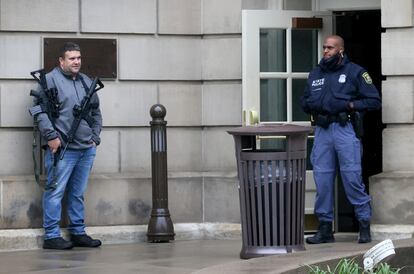Michigan’s new gun laws explained
A series of new laws seek to keep guns away from minors, and would take firearms from those who are a danger to themselves or others

One year after the Michigan State University shooting, the state has implemented several new laws to fight gun violence. Gov. Gretchen Whitmer and the Democratic-led legislature signed these bills into law to reduce gun violence by addressing some problems in the state’s previous gun laws. These laws focus on four areas: Universal background checks, safe storage requirements, Extreme Risk Protection Orders (also known as red flag laws) and limits on domestic abusers. Here’s a breakdown of the new laws that went into effect on February 13, 2024.
Universal background checks
Although basic background checks are already implemented in Michigan for handguns, the new law extends it to all firearms, including long guns, which means that every buyer of any type of gun would have to go through a background check before being able to purchase. As per Public Acts No. 18, No. 19 and No. 22, these background checks will look for previous felony convictions, history of domestic violence or mental illness and other details that could be relevant.
Safe storage
Public Acts No. 15, No. 16 and No. 17 seek to avoid children getting easy access to guns in households. The laws require to keep unattended weapons unloaded and locked with a locking device or stored in a locked box or container if there’s a chance that a minor is likely to be present in a household. If someone who owns a gun is going to receive a child in their home, they need to lock away any firearm, which should be unloaded.
If a minor possesses or displays a firearm in public or in a careless, reckless, or threatening manner, the owner of the gun could face a misdemeanor charge with a maximum penalty of 93 days imprisonment or a fine of up to $500, or both. If the minor discharges the firearm and causes injury, it could result in a felony charge with up to five years imprisonment or a fine of up to $5,000, or both. If the discharge results in serious bodily harm, the penalty could be up to 10 years imprisonment or a fine of up to $7,500, or both. In cases where the discharge results in death, the penalty could be up to 15 years imprisonment or a fine of up to $10,000, or both. These penalties may be imposed alongside any penalties for other related criminal offenses.
“Red Flag Laws”
The new “red flag” laws — under Public Acts No. 37 and No. 38 — gives a judge the power to seize an individual’s guns if the court finds they could pose a “significant risk of personal injury to himself or herself or others by possessing a firearm”. The orders are called Extreme Risk Protection Orders.
The request for the order have to come from the individual’s spouse, former spouse, a person who has a child in common with the individual, a person who has had a dating relationship with the individual, a person who has resided in the same household, a guardian, a mental health professional or a law enforcement officer. If authorized, the individual would be prohibited from possessing or purchasing a firearm.
The request would have to explain with facts why the subject poses a risk to themselves or someone else. The judge in charge of the decision would have to consider evidence of mental illness, previous extreme risk protection orders, previous or existing probation or pretrial release orders, previous or existing charges, drug or alcohol use, history of use, attempter use or threatened use of physical force, and concerning statements made by the individual.
Limits on domestic abusers
Public Acts No. 199, No. 200 and No. 201 establish more limits for domestic abusers and guns as they prevent convicted domestic violence abusers and those convicted of misdemeanors involving domestic violence from purchasing or owning firearms and ammo for eight years.
Sign up for our weekly newsletter to get more English-language news coverage from EL PAÍS USA Edition
Tu suscripción se está usando en otro dispositivo
¿Quieres añadir otro usuario a tu suscripción?
Si continúas leyendo en este dispositivo, no se podrá leer en el otro.
FlechaTu suscripción se está usando en otro dispositivo y solo puedes acceder a EL PAÍS desde un dispositivo a la vez.
Si quieres compartir tu cuenta, cambia tu suscripción a la modalidad Premium, así podrás añadir otro usuario. Cada uno accederá con su propia cuenta de email, lo que os permitirá personalizar vuestra experiencia en EL PAÍS.
¿Tienes una suscripción de empresa? Accede aquí para contratar más cuentas.
En el caso de no saber quién está usando tu cuenta, te recomendamos cambiar tu contraseña aquí.
Si decides continuar compartiendo tu cuenta, este mensaje se mostrará en tu dispositivo y en el de la otra persona que está usando tu cuenta de forma indefinida, afectando a tu experiencia de lectura. Puedes consultar aquí los términos y condiciones de la suscripción digital.









































